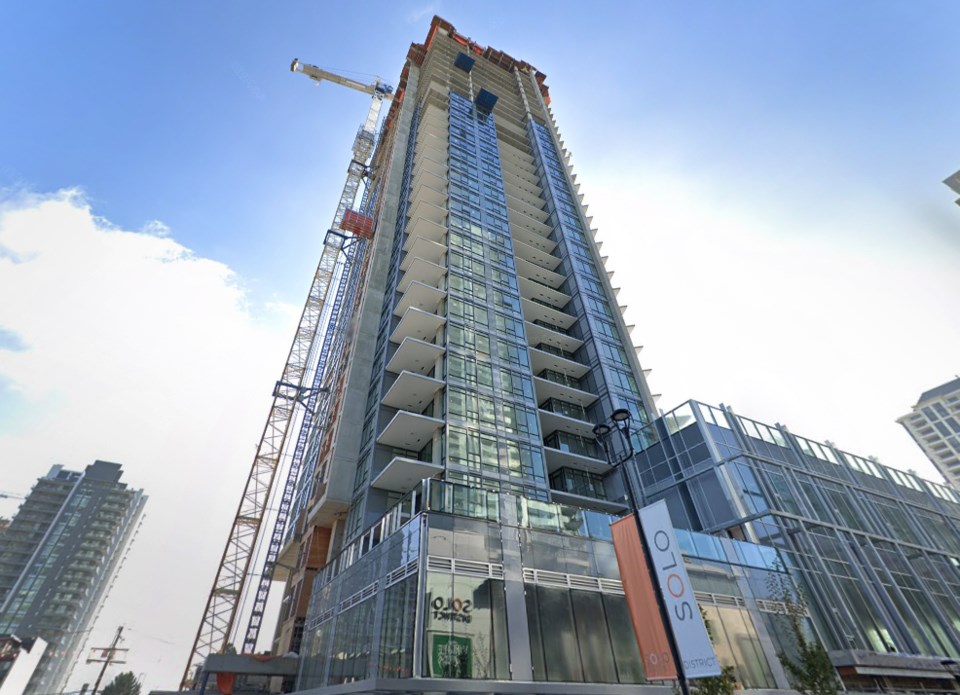If people grabbing their morning coffee at the Solo District Starbucks in Burnaby had looked up on the morning of March 3, 2021, they might have noticed something wasn’t quite right 42 storeys up on the condo tower under construction next door at 2085 Skyline Dr.
At about 9 a.m., workers were removing a corner flytable (a large metal structure that supports the concrete slabs poured to create each floor) when things went awry, according to WorkSafeBC reports obtained by the NOW through a freedom of information request.
During the procedure, the outer edge rear leg and wheel broke off the platform.
“Partly” held by a tower crane, the structure flipped and wedged itself between the 42nd and 43rd floors, “overhanging the city street below,” one inspection report said.
Workers attached safety straps to the precariously perched platform to keep it in place, and WorkSafe ordered work to stop until “all hazards” had been mitigated.
No injuries were reported.
Three fines since 2018
WorkSafe fined the contractor involved, Whitewater Concrete, $94,956 for the incident, concluding it had involved a number of “high-risk violations.”
The errant flytable had been altered to include an overhanging cantilever, but the professional engineer had not signed off on the drawings for it, according to an inspection report,
“Certified drawings were provided to this employer by TNAI Engineering Ltd., however, I was told White Water Concrete Ltd. … drew their own drawings which were not certified,” stated a WorkSafe inspector.
The inspector also found Whitewater hadn’t ensured the flytable was set up and used in accordance with the “up-to-date certified worksite-specific plans.”
“This is evidenced by the fact that the as-built flyform observed on site was substantially different than the worksite-specific plans for the flyform,” stated the inspector.
The broken wheel leg had snapped while two workers were trying to pry the platform over a small curb, according to the report.
The inspector noted the wheel used wasn’t in accordance with the flytable design and had “no significant side-load strength.”
WorkSafe ordered Whitewater to make sure a professional engineer certified all future worksite-specific plans in accordance with the regulations and that flyform drawings detailed all the information required.
“The employer must ensure that the application drawings and any supplementary instructions required … including special procedures required for non-typical floors, are made available to workers involved in any part of the assembly, flying, use, dismantling or reuse of each flyform panel,” states one report.
This isn’t the first time WorkSafe has fined Whitewater.
Since 2018, the company has racked up $180,244 in penalties in relation to three workplace incidents.
But Whitewater is in the process of appealing the latest fine to the Workers’ Compensation Appeal Tribunal.
A tragic history
Current regulations governing the use of flytables or flyforms in B.C. were heavily influenced by one of the deadliest workplace accidents in Metro Vancouver history.
On Jan. 7, 1981, four carpenters working on and around a flyform on the 36th floor of the Bentall IV tower in Vancouver plunged to their deaths when the platform broke free and fell to the plaza below.
The tragedy sparked a coroner’s inquest and a provincial inquiry into B.C.’s construction industry.
The inquest found the contractor had made alterations to the flyform without proper authorization, and one of the jury’s recommendations was that flyforms should be designed by professional engineers registered in B.C. and not altered without the engineer signing off on the changes.
Workplace safety advocates, including representatives from the B.C. Building Trades Council, mark the anniversary of the tragedy every year.
“The Bentall Tower IV accident was so catastrophic that 41 years later, members of the building trades still talk about where they were, what they heard, and how it affected the entire industry,” BC Building Trades executive director Brynn Bourke said in a news release this January.
When asked to comment on the Whitewater incident in the context of the Bentall tragedy, however, the council declined.
WorkSafeBC told the NOW the severity of the penalties it issues are based on the nature of the violation, a company’s history of violations and the size of a company’s payroll.
Penalties can be bigger if a serious injury did or could have happened, if an employer showed willful or egregious disregard for the health and safety of workers or if the employer has been fined for a “substantially similar” violation in the past three years.
The NOW reached out to Whitewater for comment but had not heard back by the time of publication.
Follow Cornelia Naylor on Twitter @CorNaylor
Email [email protected]



